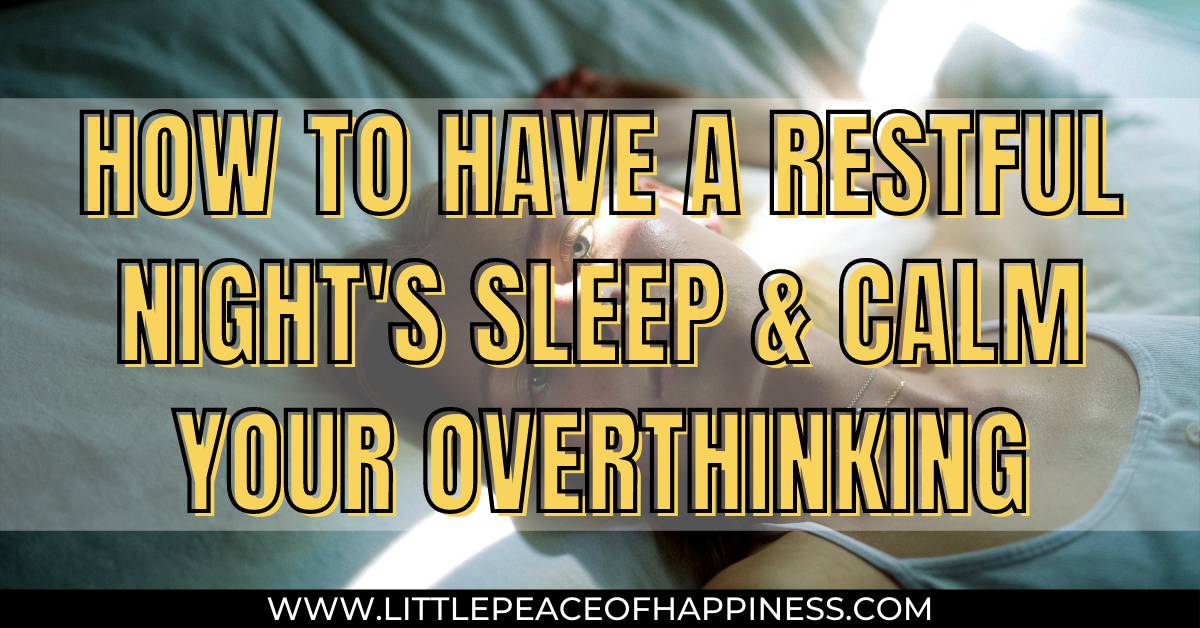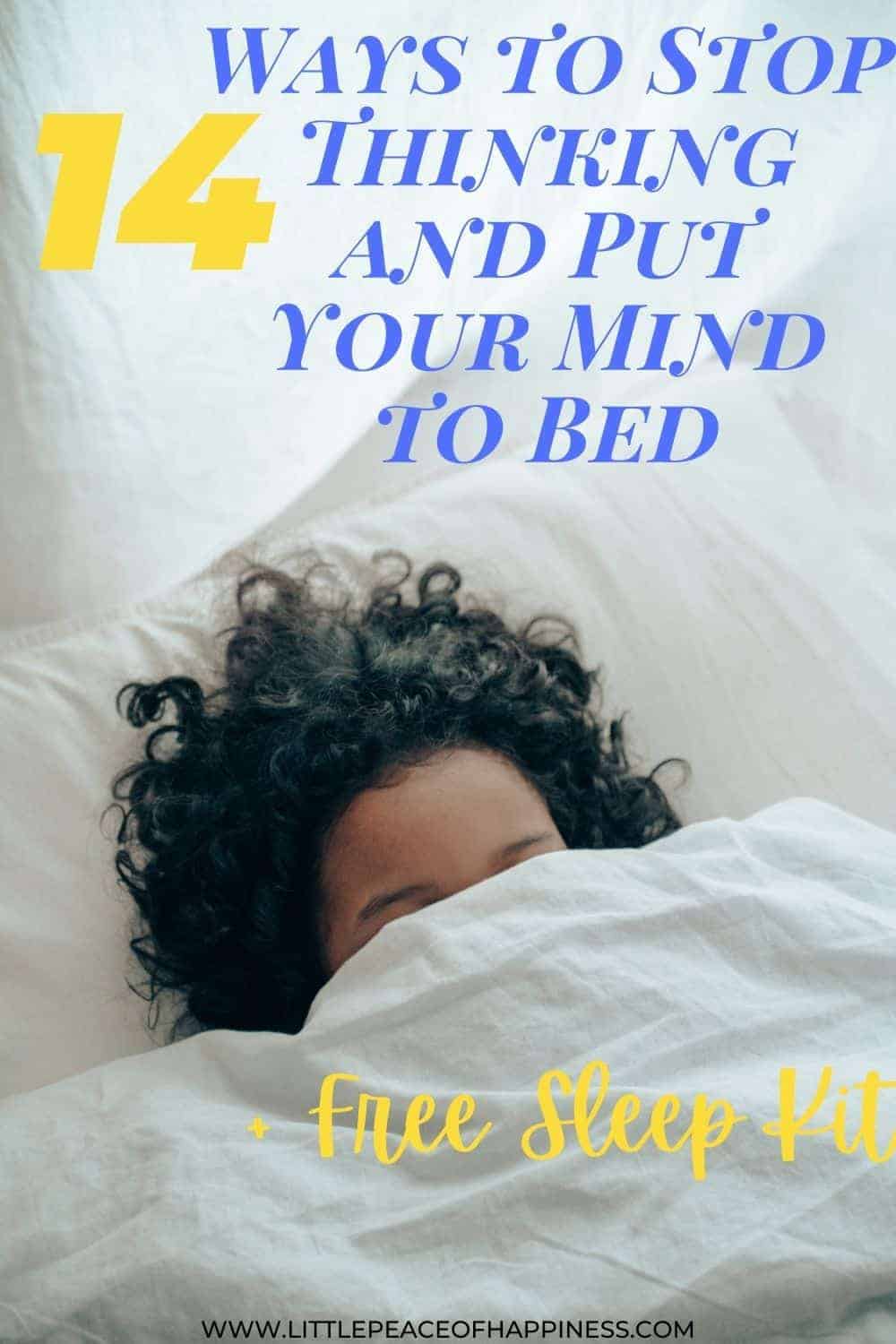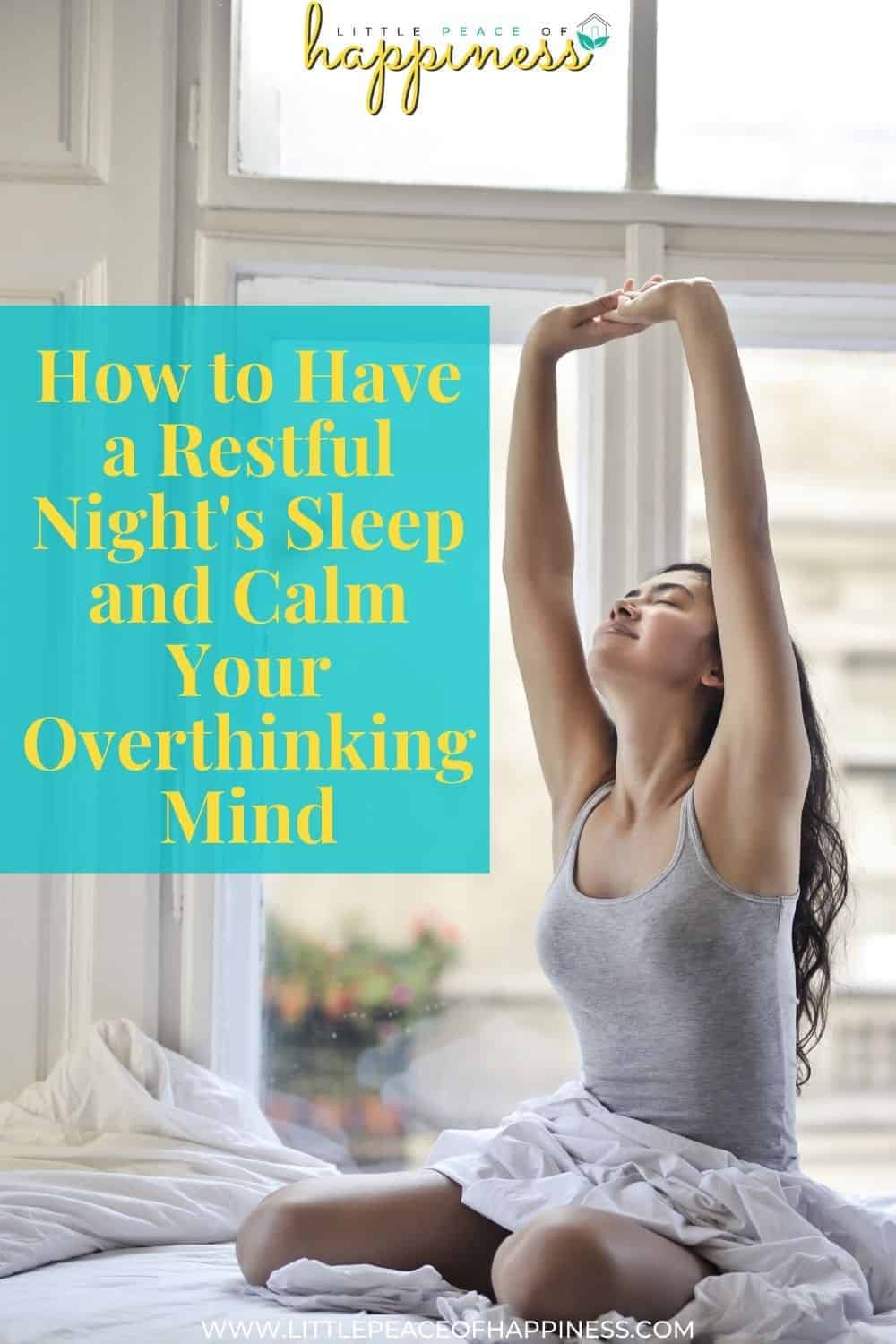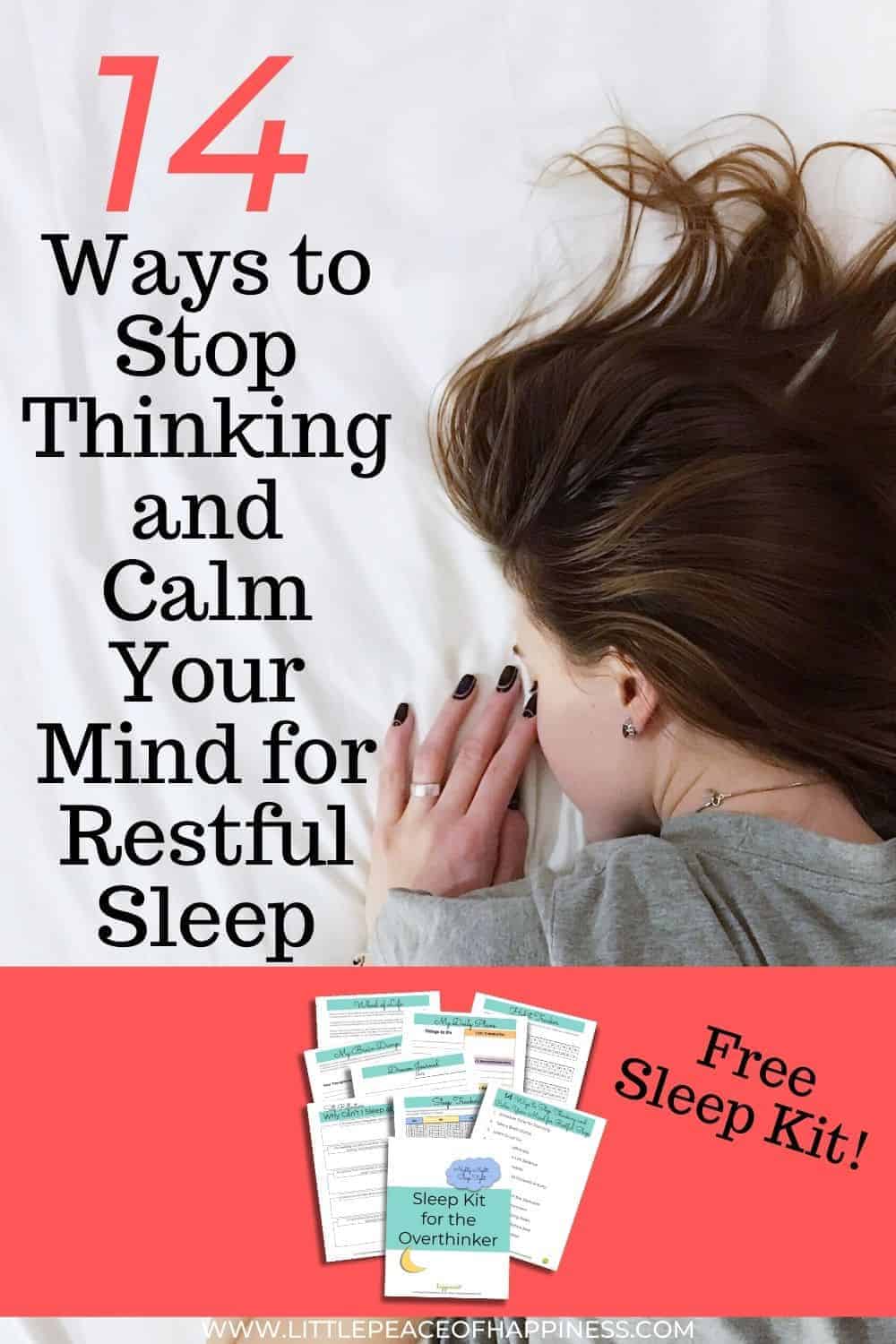So you’re having trouble sleeping and you’ve landed here hoping to find the ah-ha solution to your never-ending thoughts that are creeping in the night. Heck, it might even be 2 AM right now when you’re reading this and you’re in desperate need of help!
You’ve been tossing and turning in your bed and you just can’t seem to get comfortable. What originally started as one thought very quickly turned into another…and then another. Before you know it, your alarm is going off in 2 hours!
This has been happening for days or even weeks and now you’re just so annoyed. You might be waking up cranky thinking “I just want ONE. GOOD. NIGHT. Ughhhh!”

Let me tell you that I feel your annoyance and frustration. I have lied in that same bed after many long (but short) nights waking up and complaining about the quality of sleep I had (or didn’t). I did the same thing you’re doing now. Trying to find a solution to your late-night thinking when you need to sleep.
Please know that I am not a professional and I am sharing my own thoughts and opinions or what I researched online.
In this post I share 14 ways to stop thinking at night so you can have better sleep and give you a FREE Sleep Kit for Overthinkers.
Some of the links in this post are affiliate links. This means if you click on the link and purchase the item, I will receive an affiliate commission at no extra cost to you. All opinions remain my own.
WHAT'S IN THIS POST?
The Importance of Sleep
Sleep is essential to your mental health and gives your brain a rest from the daily mental tasks.
When I was in school, I had a teacher who told me that cramming the night before with a couple hours of sleep was actually worse than just staying up through the night. The little hours of sleep after a mind-stimulating study session is not enough time for the brain to rest and remember the information you spent hours trying to cram.
Have you ever had those moments where you didn’t get enough sleep and when someone was trying to talk to you, your brain was foggy and you blamed the coffee for not kicking in?
It’s not the coffee, it’s you.
Not only is sleep important for brain function, it allows our body to rest from strenuous activity. When you’re used to being on the go all the time, you don’t realize how tired your body is until you stop and take a rest. As soon as your body hits the bed after a long day on your feet or hitting it hard at the gym, your body needs a break.
Everyone will experience poor sleep quality from time to time. Factors that affect your sleep will depend on your current life events, daily activities, or environmental conditions.
What Can I Do to Sleep Right now?
If you’re in a pinch and need to sleep right now, pin this post so you can read it later and learn about long term solutions to your sleepless struggles.
For now, you can:
- Take a supplement such as Melatonin (here’s what I use) or drink chamomile tea.
- Focus on the inside of your eyelids. While you’re staring at the back of your eyelids, use the old trick of counting as you wait for the melatonin to kick in.
- Do breathing exercises. Focus on the sound of your inhales and exhales and control and slow down your breathing. Slowly inhale for 4 seconds, hold for 2 seconds, exhale for 4 seconds. Continue to do this to help you relax and distract your mind from your thoughts.
This isn’t a permanent solution, but it may work in a pinch. You can also try to tire yourself out by reading the rest of this post!
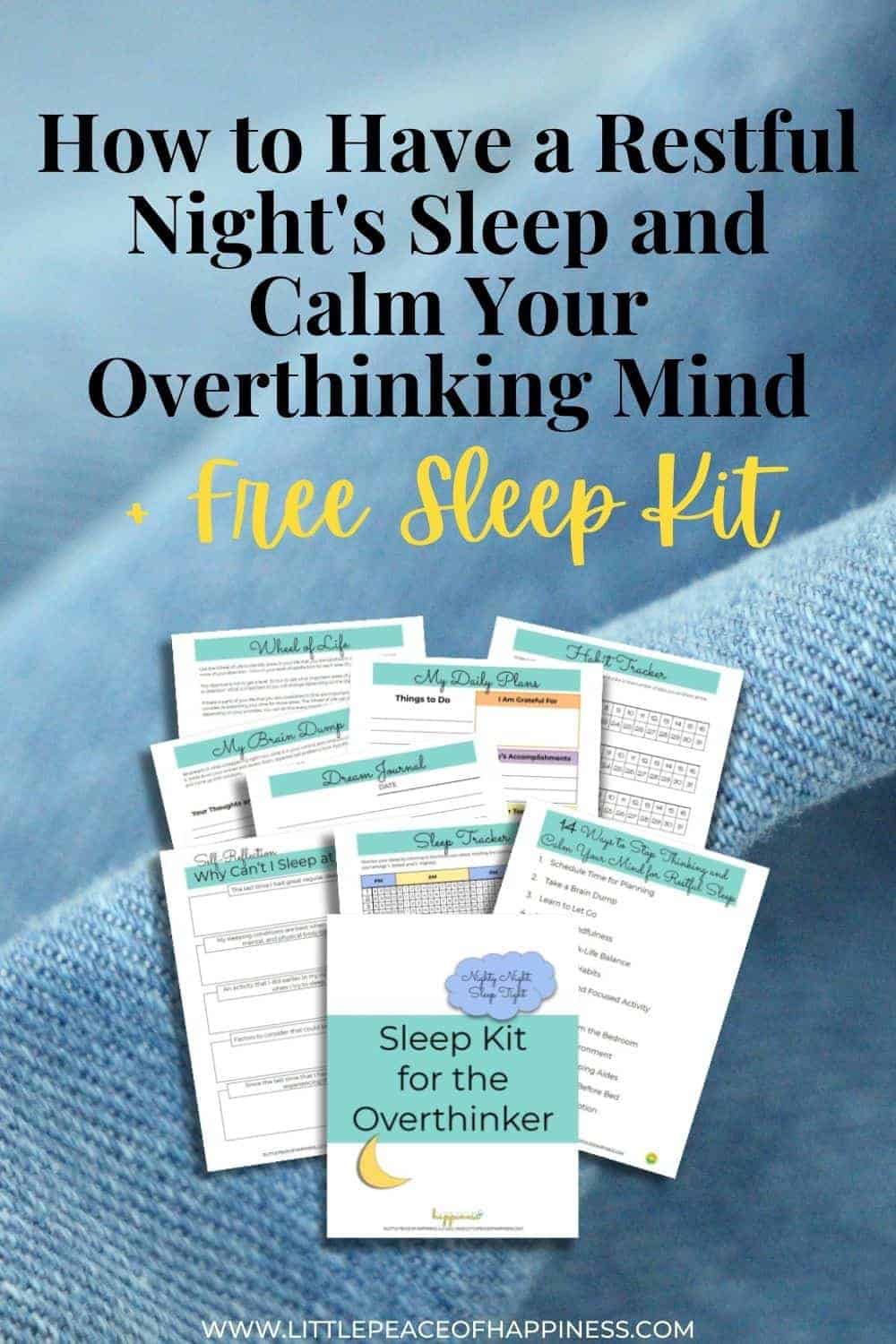
Why Can’t I Sleep Through the Night?
When you clicked on this, you thought it was pretty self-explanatory right? What I’m really wondering is are you awake because you’re thinking or are you thinking because you’re awake?
I need YOU to dig into the real reason why you’re having the insomnia to begin with.
To figure out the solution to 2+2, you need to learn the basics of addition and recognize that the plus (+) symbol means you have to add.
Before you can solve your problem of sleepless nights, you need to learn what is really keeping you up so you can use the right approach.

Self-Reflection: Find out Why You Can’t Sleep at Night
At some point in your life, you probably have experienced a decent night of sleep. As you’re digging into your why, here are some prompts that can help guide you:
- When was the last time you had a good night’s rest? What were your environmental, emotional, mental, and physical body conditions like?
- Has anything in your life changed since then?
- Is your lack of sleep a consequence of something you did earlier in the day/night?
- Has something in your environment or life changed?
- What are your sleeping conditions like (quality of the bed, temperature, lighting, etc.)?
These are just some prompts to get you started. I encourage you to uncover your why behind not getting enough sleep.
14 Ways to Stop Thinking and Calm Your Mind for a Restful Sleep
To achieve better sleep quality for the long haul, you’ll have to put in the work to stop overthinking and calm your mind. If you think it’s part of your personality, it’s not that either. Overthinking is a behavior. One that is repeated over and over and you let it run on autopilot.
If you’re ready to take control, you got this! I believe you can do it and you deserve many nights of restful sleep after a long day.
Like you, I used to suffer from many nights of lost sleep. There are some rare occasions that my thoughts will keep me up at night when I’m excited about something. Now that I am aware of what keeps me up, I have been able to get back on a regular sleeping cycle faster and with less stress.
Below, I share what I have personally done or what I have found online. I can’t guarantee that what worked for me will work for you, but I hope it can get you pointed in the right direction.
Ready to be on your way to sweet dreams? Let’s go!
Schedule Time for Planning
One of the thoughts that can keep us up at night is thinking about all the things we need to do the next day. Making a mental to-do list in bed doesn’t seem like a big deal at first. But those thoughts can escalate and turn into stress when you overthink about all the little things associated with the tasks.
In 2020, we moved cross-country to our home state and had to sell two homes and buy a third that we would live in. We came a long way from when we were first-time homebuyers, but there were still so many things we needed to do before buying a home. During this crazy time in our lives, it really helped us to have conversations after dinner about all the things we needed to do the next day.

Towards the end of your “work day,” jot down anything you plan to do the following day, weeks, or months. Not only will it keep those thoughts from popping up later, but it will help you be more productive.
Schedule a time to plan that is right for you. However, avoid doing it right before bed.
Take a Brain Dump
If you have worries keeping you up at night, set aside time during the day to let those thoughts go.
Stress and anxiety can come from everyday life that we don’t realize like that bathroom remodel or dream kitchen you’ve been planning. When we bought our first house, we immediately starting listing all of the home renovations we wanted to do in the future. Just the thought of all the updates was stressful considering our home budget was quickly getting low. After jotting them down in my notes, I was able to rest a little easier knowing I could always get back to it later.
Limit your time to 30 minutes for writing out all of your troubles and concerns. If you spend any longer than an hour, you can get lost in your negative thoughts and it can consume you. Then, review your worries:
- Which thoughts are real concerns and issues that you are facing right now?
- Which ones are hypothetical “what if” scenarios that are not a problem right now?
- Which of those worries are in your control?
- For the real worries and concerns happening right now and in your control, what can you do to solve one of them?
Overthinking at its worst will offer you only problems and no solutions and this will build your stress and anxiety. You will never find solutions to the “what ifs.” If it’s not a real problem right now, it’s not worth your energy, time, or headspace.
Be present in what is happening right now, what is in your control, and what you can do to solve it. Write down your worries and review them, separate real problems from hypothetical “what ifs” and come up with solutions. Turn your overthinking to problem solving!
FREE Sleep Kit for Better Sleep
sign up to get access to our freebie library where you’ll find more useful goodies for digital planning and printing!
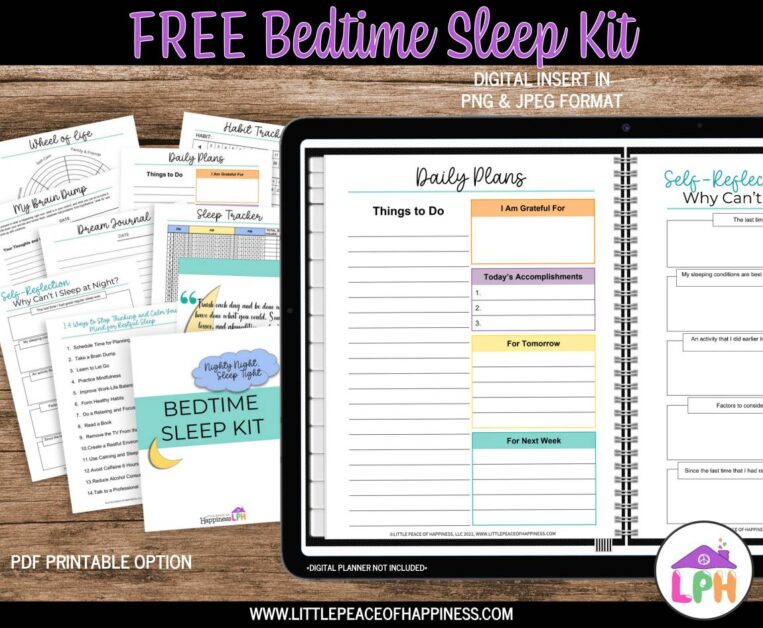
- 14 Tips for restful sleep
- Self-Reflection
- Brain Dump
- Daily Planning Page
- Dream Journal Page
- Life Wheel Balance
- Habit Tracker
- Sleep Tracker
- Inspirational Quote
Practice letting go
Everyone has experienced a trauma at one point or another in their life that can trigger emotional thoughts and feelings. When you are overthinking, you are allowing your thoughts to run your life.
Learning to let go and accept reality for what it is and move on from that will be the greatest gift you can give yourself. Not only will this help reduce your nightly thoughts, it will lift the heaviness on your mind and in your heart.
This is one that I struggled with for years, until I came to accept the things I cannot change or have control over. I can focus on what I am doing now and what I choose to do in the future. I let go of the person I thought I should be and am embracing the person I am.
Identify what is holding you back and keep your thoughts run in overdrive. Let go of those you cannot change or control and focus on what you can.

Practice Mindfulness
Mindful-what? Your mind is already full, so why am I suggesting that you practice mindfulness?
The fact that your mind is so full is the problem and practicing mindfulness is the solution. The irony for us overthinkers is that overthinking happens without thinking, it just happens!
Isn’t that just crazy?
Practicing mindfulness is being present in the moment and being aware of when your inside voice is taking over. Being mindful will help you become more aware of the inside voice speaking when you’re trying to listen to others, focus on an activity, or sleep.
When you hear your inside voice taking over, stop to recognize that it is there, and reframe your mind so you focus on the present.
Improve Your Work-Life Balance
When you are trying to get some sleep, it’s not the right time or place to think about work, school, family, money, etc. Too much time in one area of your life and not the right amount of time in another can leave you feeling burnt out and tired.
An unhealthy work-life balance could be a factor preventing you from a quiet headspace when you sleep. There’s a chance you are giving too much attention to an area in your life that is causing you to stress or worry and not enough attention to your mental health.
Self-reflect on what areas of your life you may be giving too much of yourself to and what areas need more of your attention. If what you’re thinking about is what needs your attention, do it during the day.

Form Healthy Habits
In the beginning I talked about overthinking being a habit and there are good and bad ones. If you want to break the cycle of overthinking when you’re trying to have a restful night’s sleep, you need to form healthy habits.
I can’t tell you how long it’s going to take to break the habit. What I can tell you is that when you practice something long enough, the behavior will become automatic and will no longer feel like a chore to do.
Many of the ways I share in this post can be a new habit you can form that will help you stop overthinking when you’re trying to sleep. The longer you do the activity, the easier it will get. Before you realize it, your nightly routine of overthinking will be gone.
When you think it’s going nowhere, just keep at it. Because it’s something you’re not used to, it will feel weird at first.
You fell a few times when you were learning how to walk, but you got there! I have a habit tracker you can use as a separate tool or in the Sleep Kit for Overthinkers in the Happy Store.

Do a Relaxing and Focused Activity
To overcome the habit of overthinking, you need to distract the thoughts from forming. By doing this repeatedly, you are breaking the overthinking habit and can be in control of your thoughts.
Try an activity that will refocus your attention away from your thoughts. This should be a relaxing activity that is calming and not stimulate negative emotions or thoughts.
Here are some relaxing activities you can try:
- Build a puzzle
- Watch a funny movie
- Take a 30 minute bath
- Listen to relaxing music
- Color a coloring sheet
- Do Yoga
- Go for a nature walk
- Read a book
- A crafting activity such as crocheting, sewing, knitting, painting, etc.
- Enjoy a nice cup of hot calming herbal tea
If you are doing an activity before bed that is raising your emotions or thoughts, save that activity for the day and try a relaxing and calming activity closer to bedtime.

Read a Book
Instead of using electronics before bedtime, try reading a fiction book that you enjoy. Preferably, one that is not on a screen so you give your eyes a break from the artificial light. Looking at your phone at night can mess up your circadian rhythms and will confuse your brain when it needs to rest.
I suggest reading a fiction book because you can focus on the story you’re reading instead of it provoking more thoughts like a non-fiction book could do. Or maybe you’re just the opposite and reading fiction would excite you too much. If you don’t like reading non-fictions to begin with, it might help put you to bed!
The main point is to read something that will distract your mind from thinking before bed that will also tire your eyes. I like to read 30 minutes before bedtime as part of my routine to wind down my night.
Remove the TV from Your Bedroom
Watching TV can give you a nice way to relax, but if you’re really getting into what you’re watching, it can keep you up for hours. I am so thankful for streaming services like Netflix and Hulu, but I can binge watch a TV series until 5 AM!
Can you relate? Or does watching TV actually make you think more? Either way, out of the bedroom it goes!
Keep your TV time for the waking hours and use it as a form of self-care to unwind your night after dinner but before your pre-sleep routine.
Create a Restful Environment
Creating a restful environment is more about prioritizing your bedroom for actual sleep and relaxation. As an overthinker, it’s already challenging enough to fall asleep. A poor sleep environment can make it difficult to stay asleep.
Here are some ideas for a restful sleeping environment:
- Seperate your workspace from your sleep space
It can be hard to relax in bed when you have your office in the same room. Especially if your office is a reminder of all the things you need to do the next day or bills you need to pay. In addition, the emitting lights that come from your computer or printer can be too bright if you prefer a dark sleeping space.
- Control the lighting
Depending on our preference, you may like to sleep in total darkness (like me) or with lights. Both are easy fixes that you can do today to give yourself a better night’s sleep. Use caution when sleeping with lights, this can affect your circadian rhythm and confuse your brain when it’s day or night.

- Change your bed if it’s outdated, sinking, too hard, too soft, etc.
We used to sleep on the same mattress that we had for 10 years and I would wake up in the middle of the night tossing and turning because of the lack of body support. Beds can be expensive up front, but they are worth the investment for a good night’s sleep. Same thing goes for your pillow.
- Adjust the Thermostat
Do you find yourself too cold in the night and your covers aren’t giving you enough warmth? Turn up the heat! Or do you wake up sweating in the middle of night (that’s me)? Then turn it down. Find the optimal temperature for comfortable sleep. If you can, use a smart thermostat to control the temperature based on the time. We use the Ecobee Smart Thermostat that connects to our Echo Dot with Alexa.
- Declutter the Space
Did you know that clutter can add to your mental stress and anxiety? Sleeping in a space that is surrounded by clutter can be distracting to your mind. After you declutter your space, you’ll be surprised how much lighter your mental and emotional state is.

- Use essential oils such as lavender
Essential oils are used in aromatherapy and lavender can be used for calming and relaxation. Here’s the oil diffuser that I use in our bedroom. I purchased my essential oils from Revive. I use their blend oils called Sleep and Breathe Air. If you want to try Revive for the first time, you can get $10 off $50, here.
- Add a humidifier if the space is too dry
Living in Colorado over the winter nights, the air can be very dry. I used to wake up in the middle of the night because of a dry nose or start coughing. After I added a humidifier to my bedside, I could finally sleep through the night. This is a newer version of the humidifier that we use.
- Use hypoallergenic bedding if you are sensitive to dust mites
If you have allergies, then you can benefit from using hypoallergenic bedding to your space. I used to have a stuffy nose from allergies when I slept until I switched out my covers. This is the pillowcase covers and duvet cover I use. If you want to clean the air, I recommend adding an air purifier to your room, we like this one.
If your space is making it hard for you to fall asleep or stay asleep, it may be time to change up your space. Changing up a space doesn’t have to cost a lot, in fact, I even wrote a post on how to update your home on a budget.

Use Calming and Sleeping Aides
Calming and sleeping aides can help you while you are working on the ways I previously mentioned to stop thinking and calm your mind. I don’t suggest this to be the only thing you try as it’s not a permanent solution.
In addition to the ways I previously listed, calming and sleeping aides have helped me relax so I can fall asleep before my thoughts creeped in. I don’t need them as often, but I have them on hand for those hard to sleep moments.
Here are the calming and sleeping aides I have tried that have worked for me. Follow manufacturer instructions and consult with your primary care provider as needed.
- Chamomile Tea (I haven’t tried this brand specifically; it has a high number of ratings)
- Natrol – Melatonin 5 mg Extra Strength
- Calm – Magnesium Citrate Supplement, Anti-Stress Magnesium Supplement Drink Mix
- NatureMade – Extra Strength Magnesium 400 mg
Use any of these sleeping aides in addition to the other ways I listed in this post to help you fall asleep.
Avoid Caffeine 6 Hours Before Bed
According to the Sleep Foundation, too much caffeine throughout the day can have detrimental side effects to your sleep. High caffeine consumption can make it difficult to fall asleep, stay asleep, and give you nighttime anxiety.
That same anxiety can trigger your never-ending thoughts and put you in a vicious loop. You won’t be able to sleep if you drink too much coffee, too close to bedtime. Which will make you feel tired in the morning making you want to drink more coffee.
For those with an overactive mind, caffeine can stimulate it even more and lead to anxiety, restlessness, and dependency. The FDA suggests that a safe amount of caffeine is 400 mg or 4-5 cups per day and to avoid drinking it at least 6 hours before bed.
I personally avoid caffeine 8 hours before bed.
Keep in mind that your sensitivity to caffeine may be different to the next person. You may need a larger period of time without it. Pay attention to your caffeine consumption. Remember that caffeine is in more than just coffee and tea. The soda during dinner could be what’s keeping you up.

Reduce Alcohol Consumption
I don’t mean to burst your champagne bubble. I’m not here to judge or lecture you on your alcohol intake. What I will share is how alcohol can play a role in your sleep so you can make a decision on what’s best for you.
A study supported by NIH found that low to moderate doses can help you fall asleep initially, but will ultimately disrupt your sleep quality and can lose its effectiveness after continued use. In addition, using alcohol to sleep can make you more tired and less alert during waking hours than if you avoided drinking it altogether.
Per Medical News Today, the withdrawal from alcohol while you sleep will give you night sweats and contribute to anxiety and depression, and increase your sleeping problems and nightmares. A more recent NIH study in 2020, found that patients who were receiving treatment for alcohol dependence improved their sleep quality and regularity.
If reducing your alcohol consumption is difficult or you struggle with alcohol dependence, please seek professional help from your primary care provider. You can also find resources to the National Institute on Alcohol Abuse and Alcoholism here.
Talk to a Professional
If these ideas do not help you sleep after a period of time, consult a medical professional. Overthinking may be a sign of something deeper and these strategies alone, may not work.
Talking to a professional is another way to release your thoughts so you’re not taking them to bed. They may offer a different perspective to your worries, stress, and anxiety that you may not have tried.
Share with your medical professional or counselor about what you have tried, for how long, what has worked and hasn’t.
Nighty Night, Sleep Tight
“Finish each day and be done with it. You have done what you could. Some blunders, losses, and absurdities no doubt crept in; forget them as soon as you can. Tomorrow is a new day; let today go so you can begin tomorrow well and serenely, with too high a spirit to be encumbered with your old nonsense. Each new day is too dear, with its hopes and invitations, to waste a moment on yesterdays.”
Ralph Waldo Emerson
By the end of this article, you have learned the importance of sleep quality, the why behind your overactive mind, and 14 ways to stop overthinking so you can enjoy the benefits of a good night’s sleep. Getting enough sleep on a regular basis is an essential need to and can promote better mental health, physical well-being, and increase productivity.
Recognizing and making notes of the thoughts that keep you up, will give you a starting place in what areas you need to work on. To figure out the source of your thoughts, go through the prompts in the post section “Self-Reflection: Find out Why You Can’t Sleep at Night.”
I created a digital and printable Sleep Kit for Overthinkers with tools and resources that goes along with this post that you can use to break the overthinking habit and get better sleep at night. You can reuse the pages over and over again.
Here’s a recap of the 14 Ways to Stop Thinking and Calm Your Mind for a Restful Sleep
- Schedule Time for Planning
- Take a Brain Dump
- Learn to Let Go
- Practice Mindfulness
- Improve Work-Life Balance
- Form Healthy Habits
- Do a Relaxing and Focused Activity
- Read a Book
- Remove the TV From the Bedroom
- Create a Restful Environment
- Use Calming and Sleeping Aides
- Avoid Caffeine 6 Hours Before Bed
- Reduce Alcohol Consumption
- Talk to a Professional
Wishing you a Little Peace of Happiness and a well-rested night,

Related Reading: 20 Pieces of Advice for Finding Peace After Losing a Pet
Pin Me For Later!

